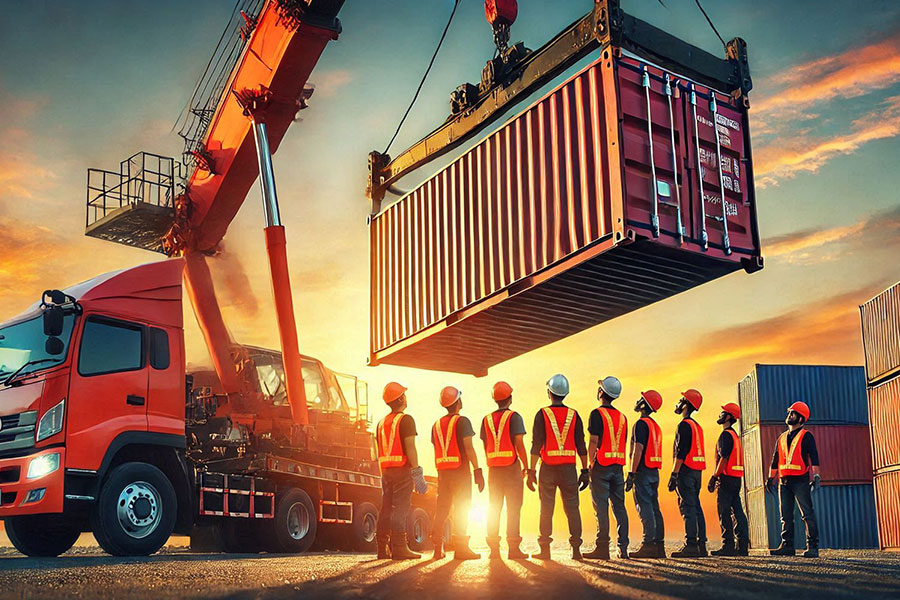Containerized shipping is a fundamental part of global trade, facilitating the transportation of goods across countries via sea, air, and land. In this process, the concepts of Net Weight and Gross Weight are crucial as they directly affect shipping costs, container selection, and compliance with legal regulations. Additionally, terms like VGM (Verified Gross Mass) and Tare Weight play an essential role in freight transport, which will also be explained in this article.
What is Net Weight in Containerized Shipping?
Net Weight refers to the actual weight of the cargo without considering the weight of packaging, pallets, or any additional equipment used for transportation.
For example, if a shipment consists of 500 kg of products with no additional packaging or pallets, its Net Weight remains 500 kg.
What is Gross Weight in Containerized Shipping?
Gross Weight includes the total weight of the cargo, along with packaging, pallets, containers, and any additional equipment used for transportation.
For example, if the same 500 kg of products is packed with an additional 100 kg of pallets and packaging, its Gross Weight becomes 600 kg.
What is VGM (Verified Gross Mass) in Containerized Shipping?
VGM (Verified Gross Mass) refers to the total weight of the cargo, including packaging, pallets, and the container itself, which must be verified before loading onto a vessel.
This verification is a mandatory international requirement to ensure the safety of ships and prevent unsafe loading of cargo. Accurate VGM calculation is crucial and must be reported to port authorities to avoid accidents.
What is Tare Weight in Containerized Shipping?
Tare Weight refers to the weight of the empty container without any cargo inside.
For example, a 20-foot container may weigh approximately 2.2 tons, which represents only the weight of the container itself, excluding the cargo inside.
Key Differences Between Net Weight and Gross Weight in Shipping
Why is the Difference Between Net and Gross Weight Important?
Shipping Costs
Freight charges are usually based on Gross Weight. This means higher Gross Weight results in higher transportation costs.
Container Selection
The Gross Weight determines the appropriate container type for shipping. Containers are designed to handle different weight capacities, making it essential to select the correct one.
Customs Regulations
Customs authorities calculate taxes and duties based on Gross Weight. Therefore, accurate weight calculation is necessary to avoid legal issues.
Safety and Compliance
Proper weight calculation ensures safe cargo transportation in compliance with international regulations.
VGM verification is essential for safe loading and vessel stability.

How Are Weights Measured?
Net Weight is usually determined by manufacturers or suppliers using precision weighing devices.
Gross Weight is measured after loading the cargo into the container, typically by shipping companies or customs authorities to calculate transportation costs and comply with regulations.
VGM is verified using large-scale weighbridges or digital measurement tools before reporting to the port.
Tare Weight is pre-determined by the container manufacturer and is usually printed on the container itself.
Why is Choosing a Reliable Shipping Company Like Versk Shipping Important?
Versk Shipping specializes in international freight transportation and has a comprehensive understanding of Net Weight, Gross Weight, VGM, and Tare Weight in containerized shipping.
With its advanced technology and expert team, Versk Shipping ensures that all weight calculations are performed accurately and efficiently. The company also helps customers:
✅ Optimize shipping costs by ensuring precise weight calculations
✅ Select the right container for their cargo
✅ Comply with international shipping regulations
✅ Ensure safe and efficient transportation
Conclusion
The difference between Net Weight and Gross Weight is a fundamental principle in containerized shipping that impacts costs, container selection, and cargo safety. Additionally, understanding VGM and Tare Weight is essential for secure and optimized shipping operations.
Choosing a trusted logistics provider like Versk Shipping can significantly enhance cost management, safety, and overall efficiency in export and import shipping.

